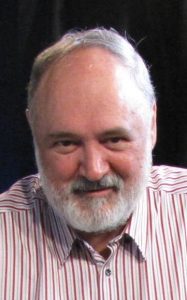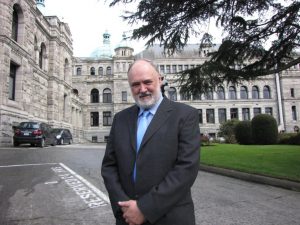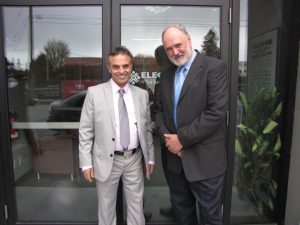


John Twigg Becomes Leader of B.C. First Party After Lengthy Career in Politics and News Media
John Twigg is a veteran journalist and communications consultant who became leader of the B.C. First Party early in April this year, 2017, after a brief stint volunteering for the B.C. Conservative Party as director of policy and communications.
“When I realized the B.C. Conservatives were not going to let me advance my Top 50 list of innovative policies for the Province of British Columbia and its people and businesses, I realized I had to look elsewhere. After a brief discussion with the Vancouver Island Party, I decided that B.C. First was the best vehicle available for advancing my platform,” said Twigg, who has been active in B.C. politics and media for more than 50 years.
Mr. Twigg, 68, was born and raised in West Vancouver where he excelled in academics, sports and citizenship. The families of both his mother and father have been prominent in B.C. politics, media and civic affairs since the late 1800’s. He began his own distinguished career at The Ubyssey student newspaper and the related Vancouver Sun intern program before obtaining a Bachelor of Arts in political science and English from the University of B.C. in 1972. He also wrote the first guide book to the West Coast Trail for the Sierra Club of B.C.
Twigg is best known for serving as press secretary to NDP leader Dave Barrett in the 1972 election campaign and then as B.C.’s first Press Secretary to Premier Barrett from 1972 to 1975. During this time, he traveled extensively around the province and country, as well as internationally, visiting bond-rating agencies in New York, London and Paris and major markets in Asia. He also designed the B.C. Legislature’s news conference theatre, which is still in use. He began a coordinated inter-ministry communications agency, now known as Government Communications & Public Engagement, and he was instrumental in launching Enquiry B.C. which provided toll-free telephone access to the provincial government. This still exists as Access Services. Among his numerous other accomplishments in that period were successfully lobbying for the creation of the West Coast Trail and Nitinat Triangle portions of Pacific Rim National Park, pioneering the concept of community gardens in Victoria’s James Bay and supporting the creation of B.C. Day.
Following the defeat of the Barrett government in 1975, he moved to Regina where he became a successful freelance journalist specializing in business and resource issues for out-of-province publications, notably covering Saskatchewan’s nationalization of the potash industry and the development of its oil, gas and uranium industries. He worked briefly as the Regina bureau chief for Canadian Press then joined the Regina Leader-Post newsroom as an award-winning Financial Editor from 1978 to 1985. He also wrote an unpublished history of Interprovincial Steel and Pipe Corp. (Ipsco) [a quasi-hybrid P3].
Twigg returned to his beloved B.C. in 1986 as an independent member of the Victoria Legislative Press Gallery, freelancing for various business publications, publishing his own newsletters and serving as a Legislature monitor for several leading businesses, professional and industry organizations. He also contributed to his brother Alan Twigg’s biography book of former Social Credit Premier Bill Vander Zalm, with whom he developed a personal and lasting friendship, despite being critical of him occasionally. He also assisted Vander Zalm in a by-election in Delta, where Vander Zalm ran for the B.C. First party, and in the successful referendum campaign against the Campbell Liberals’ hated Harmonized Sales Tax.
Twigg left the press gallery in about 2000 and served briefly as leader of the fledgling B.C. Refederation Party, which favoured renegotiating B.C.’s terms of union, but it did not work out. He settled on the family homestead in Campbell River where he was a single father to his son James until James graduated from high school. He also helped his father, Arthur Twigg, complete the self-published book Union Steamships Remembered. After the illness and death of his father, he and his new wife Laura became caregivers to his dear grandmother, Rubina Twigg, until her death at age 102 in 2008.
In 2010 Twigg launched a new career as an independent journalist and communications consultant, with a long-running show on Campbell River’s cable television service and another show on Spirit-FM, a local Christian radio station. He also has closely monitored B.C. politics and public affairs, been active on Twitter as @Twiggjohn and a board member of the Campbellton Neighbourhood Association and its new community garden member.
“At this stage in my life, I am thrilled to have another opportunity to make a positive contribution to British Columbia’s future and I look forward to helping B.C. First emerge as a political force,” said Twigg. He was a close friend of party founder, Roger Rocan, for many years until Rocan’s death about 10 years ago and understands well the party’s original ethos and current directions.
“I am very grateful to party president, Sal Vetro, for not only keeping B.C. First properly registered but also keeping it active and visible in previous elections,” said Twigg, noting with Vetro that B.C. Liberal Party Premier Christy Clark occasionally has been poaching the name “B.C. First” in some of her government and party rhetoric.
“What B.C. First stands for is honesty and integrity in government, putting the broad public interest first in all things,” said Twigg, recalling that Rocan often took an aggressive pro-province stand in federal-provincial relations. The Campbell-Clark Liberals have been very often and badly abusing the public interest, wasting taxpayer dollars on vain publicity schemes and doing little to pressure successive federal governments to meet their obligations in B.C., notably in abrogating responsibilities for in-shore sea waters.
Twigg is running in the North Island constituency for the May 9 B.C. election and is hopeful that he and several other small-party representatives can emerge with a handful of seats and hold the balance of power in a minority Legislature. He is promising to be, if elected, a strong Opposition voice, regardless of which major party wins the election.
“With my long experience in Victoria in media and government, I already know well how the systems work so I am both able and willing to fight for the many things the North Island needs but has not been getting for too many years now,” said Twigg, citing inadequate road maintenance and improvements, under funding of health, education and social services, overpriced and infrequent ferry services, lack of a regional log market, neglect of First Nations concerns and many other problems, such as inadequate access to broadband internet.
“The current political mood of B.C. is quite fractured and there is great potential for a new force to marshal populist sentiments against an out of touch, too long in power, establishment, Liberal regime. The NDP and Green parties tend to pander to minority special interests and single issue activists,” said Twigg. He noted that the B.C. First, the Vancouver Island Party and numerous small party and Independent candidates tend to take more populist and pragmatic positions than the doctrinaire and ideological positions of the major parties.
Twigg has developed numerous novel ideas for the province to consider that no other parties are offering but which have great potential to improve B.C.’s economy, politics and society such as reviving the Bank of B.C. as an investment bank issuing a new parallel currency, not supplanting the Canadian and U.S. dollars, reviving the Provincial Treasury Branch and Government Agent services to slow the depopulation of remote communities, improve and expand B.C. Ferries services, including the addition of a regional circle-route ferries system in the Salish Sea and North Coast, revival of genuine log markets to improve local access to logs and provide a genuine market valuation to ward off the American lumber industry’s countervailing duties, bulk water exports where surpluses exist, such as from Campbell River, and done by auction to avoid NAFTA concerns, new approaches to social programs, an anti-poverty strategy involving new types of housing, work experience and job training, accelerated and diversified job creation, improved home care and child care, and many other planks to be laid out by May 9 voting day – including tax reform, environmental protection, food self-sufficiency, systemic political reforms (e.g. moving the election to the fall, considering some limited proportional representation for small parties), more staff and power for the Auditor-General, investigate and reverse the financial abuses in and of B.C. Hydro and ICBC, taking over jurisdiction of inshore waters and advocating a new ferry crossing from Vancouver Island via Gabriola Island to Iona Island with a new rapid transit line to nearby Vancouver International Airport, which was successfully announced by Twigg and the B.C. Conservatives in Nanaimo on March 22.
“My goal is to make B.C. truly a shining example of social justice and economic progress to the rest of the world,” he concluded, thanking Vetro and his party’s officers for the opportunity to serve anew.
Twigg can be contacted at john@johntwigg.com or 778-348-0747 . The party’s website is under re-development at www.bcfirst.ca .